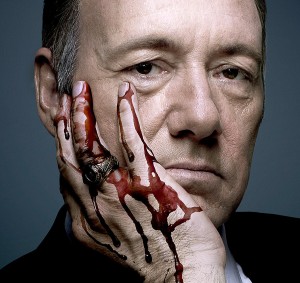House of Cards plays on antihero fervor
Why does it feel so good to root for the bad guy?

Chillin’ like a villain · Frank Underwood played by Kevin Spacey expands his Machiavellian web of influence in the second season of Netflix’s original series House of Cards, released on Friday, Feb. 14. All thirteen episodes of the second season are available now on Netflix. – Photo courtest of AP
The greatest villains alternately attract and repel their audiences, drawing us in close before going for the jugular. Some seduce us with their beauty, ambition or corrupted sense of righteousness. Others dazzle us with the polish of their silver tongues. A few steal our sympathy with heartrending back stories. The best of the worst, however, manage something far more insidious: they deceive us — and sometimes even their own creators — into believing that they’re the heroes. Frank Underwood, the ruthless House Majority Whip played with diabolical bravura by Kevin Spacey on the Netflix political thriller House of Cards, is the latest in a long line of increasingly antagonistic protagonists: the modern antihero.
From the beginning of the series — its opening scene finds Frank strangling an injured dog while delivering an eerie direct address on the futility of “useless pain” — it’s clear that this man is bad news. What some would mistake for a mercy killing is actually a callous expression of contempt for weak and worthless things. This isn’t Atticus Finch valiantly shooting a rabid dog in To Kill a Mockingbird. The scene is more in the vein of Who Framed Roger Rabbit?, when the evil Judge Doom (Christopher Lloyd) dips that poor little anthropomorphic shoe into the bubbling vat of acid and giggles while it burns alive.
It’s also the first of many indications that Frank has all the makings of a classic villain: an insatiable lust for power, an obsession with settling old scores — namely against those who blocked his Secretary of State appointment — and an equally cunning and duplicitous partner (his wife Claire, played by Robin Wright) to share in his schemes. Even the character’s penchant for shattering the fourth wall — effectively recruiting the viewers as his co-conspirators — calls to mind the devious soliloquies of Shakespeare’s Iago, Richard III and, of course, Macbeth.
A lesser show would have relegated Frank and Claire to supporting roles, serving as crooked obstacles for some Mr. Smith-style protagonist to confront and ultimately vanquish in his or her quest to clean up Washington. But House of Cards, adapted from the 1990 BBC series of the same name, puts this power-mad power couple front and center, allowing the audience no respite from their toxic allure.
The second season, which Netflix began streaming in its entirety appropriately on Valentine’s Day, follows Frank as he attempts to lock down the Vice Presidency for himself while dealing with the ongoing fallout from the murder of a fellow congressman, the machinations of his many rivals and the investigative instincts of his pet journalist and part-time paramour Zoe Barnes, played by Kate Mara.
“One heartbeat away from the presidency and not a single vote cast in my name,” Frank says, favoring his silent confidant with a wolfish sneer. “Democracy is so overrated.”
Frank is a wonderfully written character and Spacey is a wicked delight in the role, but he’s stomping on well-trodden ground. The granddaddy of the modern TV antihero is Tony Soprano, played by the late James Gandolfini, a mobster and conflicted family man forced into therapy after suffering a crippling panic attack. The field has only grown more crowded in the years since The Sopranos first premiered on HBO, with shows such as AMC’s Mad Men and Showtime’s Dexter often dominating the conversation, but the strongest recent example is undoubtedly Bryan Cranston’s Walter White from Vince Gilligan’s recently concluded AMC crime drama, Breaking Bad.
Walt’s five-season journey from milquetoast chemistry teacher to drug kingpin captured our collective imagination, showing us the American Dream’s morally blackened underbelly and turning the sun-scorched vistas of Albuquerque, N.M. into a vast, purgatorial wasteland of the soul. The show’s intent was clear from the pilot episode, when Mr. White tells his students that chemistry is the study of change: growth, decay and transformation. The series stuck to that pattern with fittingly scientific precision, charting the warped character arc of a man who used his family and a terminal cancer diagnosis as an excuse for channeling his inner Pablo Escobar.
No matter what depraved depths Walter White, Dexter Morgan, Don Draper and Frank Underwood ultimately sink to, there will always be those ready to identify with them. After all, it’s difficult to deny the vicarious satisfaction that comes from watching a character like Frank dominating his surroundings, punishing his enemies and imposing his will in the face of bureaucratic indolence and partisan bickering. In fact, compared to the current state of U.S. politics, it’s downright refreshing.
Besides, Frank’s self-serving actions often have beneficial and far-reaching consequences, such as the education bill that was passed during the first season. Even the leader of the free world isn’t immune to that sort of wish fulfillment. During a recent meeting with a group of tech CEOs, President Barack Obama confessed to a guarded admiration of Spacey’s character, saying, “I wish things were that ruthlessly efficient. It’s true. It’s like Kevin Spacey, man, this guy’s getting a lot of stuff done.”
Maybe that’s the lesson at the heart of the moral vacuum that is House of Cards: Sometimes it takes a Machiavellian bastard such as Frank Underwood to actually get things done in Washington, D.C. He’s evil, yes, but he’s a necessary evil. Maybe that’s why we’re still rooting for him.
Landon McDonald is a graduate student studying public relations. His column, “The Reel Deal,” runs Thursdays.

